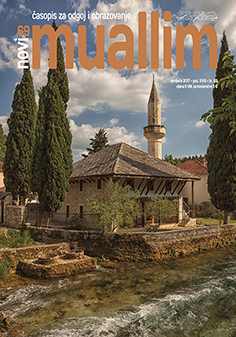PERENNIAL PHILOSOPHY AND THE ISSUES OF RELIGIOUS PLURALISM: IN VIEWS OF FRITHJOF SCHUON AND S.H.NASR
DOI:
https://doi.org/10.26340/muallim.v18i69.1445Keywords:
religious pluralism, Perennial philosophy, S.H. Nasr, Frithjof SchuonAbstract
UDK 17.023.32
2-67
This article relates about the thought of some of the representatives of traditional school within perennial philosophy regarding the phenomenon religious plurality, focusing upon observations of Frithjof Schuon and S.H. Nasr, two most prominent representatives of this philosophy or this school of thought. Discussions concerning the issue of religious diversity became especially relevant in 20th century, at the time of mutual “discovering” of different religions and rising awareness of pluralistic religious universe. It is the time of disintegration of traditional, singular and confined religious universes wherein an individual rarely had an experience of other and different. Religious diversity of 20the century posed the questions of the significance of religion as such and of the truth as such. Some have even drawn such conclusions that presented religious truth as an essentially relative term. Arguing that since there exist many religions each of which can be evaluated as potentially true, therefore it can be concluded that none is true. Thus religious pluralism served ever growing nihilism and atheism. As a possible solution to this problem of religious pluralism, Frithjof Schuon and S. H. Nasr are proposing a traditional approach to the study of religious phenomenon as a unique perspective within the philosophy of religion. Viewed from within this perspective each religion is the Religion and living one religion fully, means living the Religion as such.
Downloads
Published
How to Cite
Issue
Section
License
Naknada:
a. Časopis ne naplaćuje naknadu za obradu članaka (APC) i naknadu za podnošenje članaka.
Autori koji objavljuju u ovom časopisu pristaju na sljedeće uvijete:
- Autori zadržavaju autorska prava i pružaju časopisu pravo prvog objavljivanja, pri čemu će rad jednu godinu po objavljivanju biti podložan licenci Creative Commons imenovanje koja omogućuje drugima da dijele rad uz uvijet navođenja autorstva i izvornog objavljivanja u ovom časopisu.
- Autori mogu izraditi zasebne, ugovorne aranžmane za ne-ekskluzivnu distribuciju rada objavljenog u časopisu (npr. postavljanje u institucionalni repozitorij ili objavljivanje u knjizi), uz navođenje da je rad izvorno objavljen u ovom časopisu.


